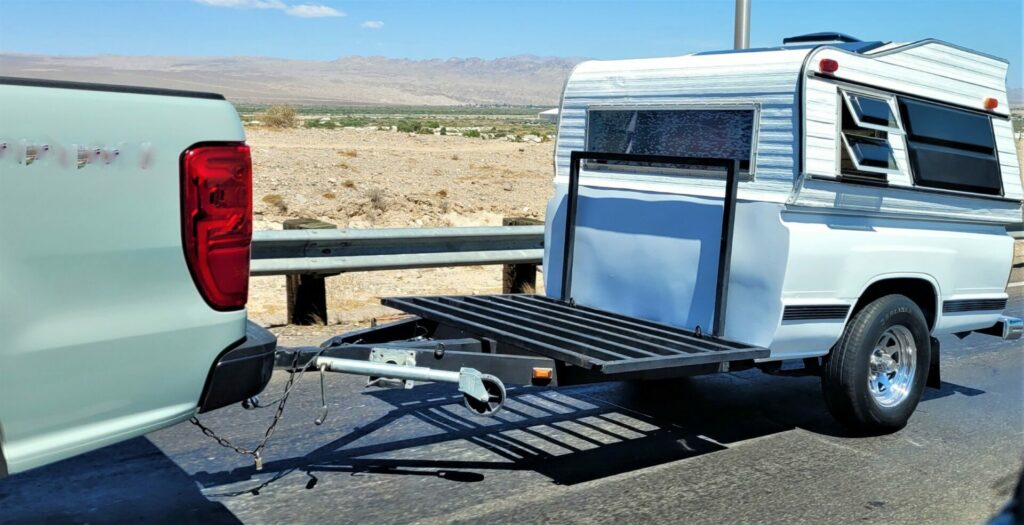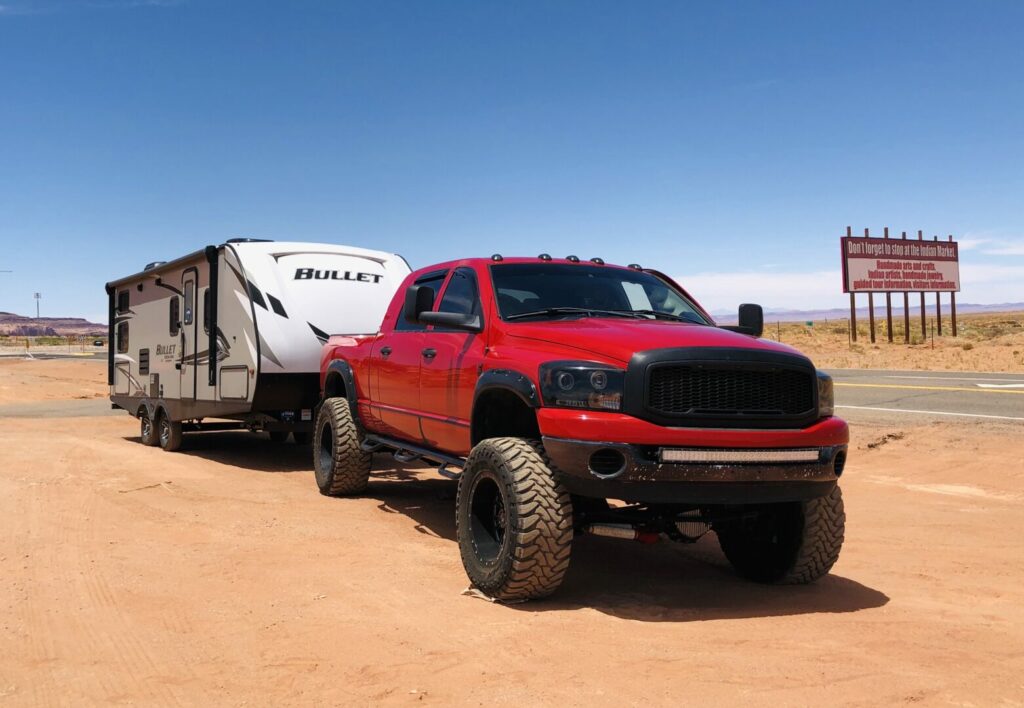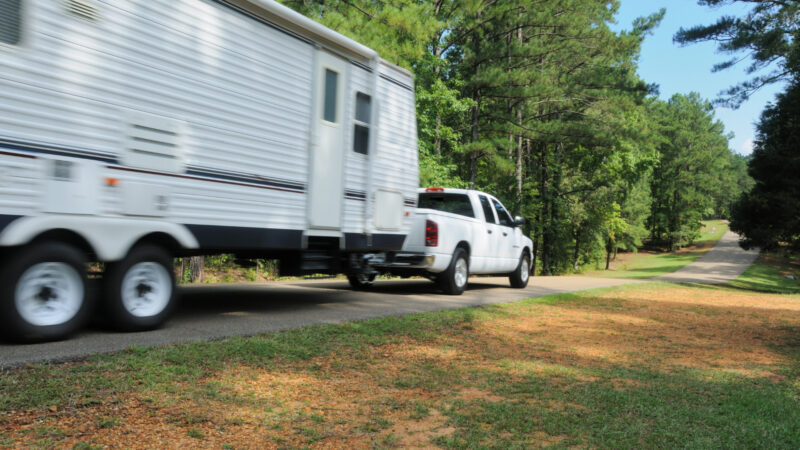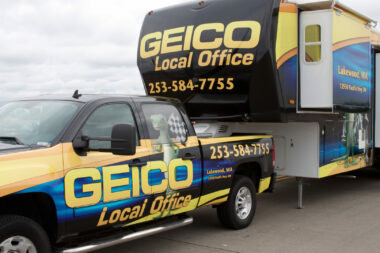Table of Contents Show
If you’re new to towing, learning and getting familiar with some new vocabulary can take some time. However, understanding the meanings can help increase your safety while towing any type of trailer. Tongue weight is a common term you’ll want to be familiar with.
Today, we’ll go through everything about tongue weight to help you understand its importance so you can stay safe while towing. Let’s get going.
What Does Tongue Weight Mean?
Tongue weight refers to the amount of force from a trailer placed on a vehicle’s hitch ball. Knowing this number is essential to ensure a smooth and safe towing experience. Exceeding your vehicle’s towing capabilities can be very dangerous for you, your passengers, and other drivers on the road.

How Much Can a Tongue Carry?
Tongue weight capacity (TWC) will vary significantly from one vehicle to another. Your hitch and tongue capacity may differ. This depends on whether the hitch was installed from the factory or as an aftermarket add-on. If that’s the case, always use the lowest rating to ensure safety.
Hitches used for towing have a hitch class rating, ranging from Class 1 to Class 4. The higher classes have a higher tongue weight capacity. Class 1 hitches can typically withstand 100 to 150 lbs, while Class 2 can carry 200 to 350 lbs. Class 3 hitches can take 350 to 500 lbs. Finally, Class 4 can carry over 500 lbs.
How Tongue Weight Affects Your Vehicle
Tongue weight and towing are like a set of scales. You want the weight evenly distributed between the tow vehicle and the trailer. Putting too much weight on the trailer and not enough on the tow vehicle will cause a trailer to sway. This can cause a serious accident, especially when traveling at high speeds.
On the other hand, putting too much weight on the tow vehicle is equally dangerous. Too much weight on the rear of a tow vehicle will take the weight off the front axle. The front axle does the steering. This reduces traction and the driver’s ability to maneuver.
Neither of these are good options. You must have a capable tow vehicle and distribute weight evenly between the truck and the trailer.

How to Calculate Tongue Weight
To calculate the tongue weight of a trailer, you can use a tongue weight scale. These devices make getting an accurate reading very easy. Simply place your trailer’s tongue on the scale and unhitch the trailer from the tow vehicle.
However, not everyone has access to this scale. You can find a local CAT scale to weigh your vehicle and trailer. You’ll first want to drive across the scale with no trailer attached.
Then hitch up your trailer and drive your vehicle across the scale. However, you don’t want any of the wheels from the trailer on the scale during the second weight. Subtract the second number from the first, and that’s your trailer’s tongue.
Keep in Mind: Do you know What Is the Average Weight of a Camper is? If not, you need to know!
What Is a Good Tongue Weight?
Because trailers come in various shapes and sizes, tongue weights will vary from one trailer to the next. However, towing experts recommend keeping it between 10% to 15% of a trailer’s gross weight. So if you have a 10,000-lb trailer, you should expect roughly 1,000 to 1,500 lbs of the tongue on your vehicle.
The larger the trailer, the more weight you’ll put on your truck. You need to make sure that your vehicle has the available payload capacity to carry you, your passengers, gear, and the tongue. You can quickly eat through your vehicle’s payload capacity depending on the size of your trailer or how much you bring with you.
What Happens if Tongue Weight Is Too Heavy?
If your tongue weight is too heavy, you’ll likely notice the tow vehicle “squatting.” The truck’s rear significantly lowers due to the increased weight. The distance between the fenders/wheel wells and the tires reduces significantly. In most cases, you overload critical suspension components, which can increase the wear and tear on your vehicle.
Overloading the rear of your vehicle will also take the weight off your vehicle’s front axle, which steers. This reduces the traction on the front tires and makes it more challenging to maneuver and turn.
How Do You Lose Tongue Weight?
If you put too much weight on the tongue, you’ll need to transfer more weight to the trailer. Moving heavy items from the front to the rear of the trailer can help correct this issue. However, you want to be careful. Avoid putting too much weight on the rear of the trailer. This can be equally as dangerous as pushing the limits.
Does Hitch Height Affect Tongue Weight?
The height of the hitch significantly affects the tongue weight. Having your hitch too high will transfer too much weight to the trailer’s axles. On the other hand, having it too low will put more weight on the tow vehicle.
An ideal towing setup would have the trailer and tow vehicle sitting level. However, this isn’t always possible. If you have a capable towing vehicle, it’s often better to have your trailer sit somewhat nose down than up.
Keep in Mind: Is an Equalizer Hitch really worth it? Let’s find out is you need an equalizer hitch for towing your RV!

Does a Weight Distribution Hitch Reduce Tongue Weight?
A weight distribution hitch distributes the weight of a trailer across both axles of the tow vehicle. It can reduce the tongue weight from a trailer when properly set up.
By distributing the weight of a trailer more evenly, drivers experience a smoother and safer towing experience. These expensive hitches can provide better and safer results. You may find them worth every penny.
Know the Tongue Weight of Your Trailer
You don’t need to weigh your trailer every time you tow it. However, have a general idea of your trailer’s differing weights. Exceeding these numbers can cause a serious situation and make towing very stressful. Once you know your RV’s weight, you’ll only need to drive across the scale if you make any modifications or add any items that may drastically change the number.
Do you know your trailer’s tongue weight?






